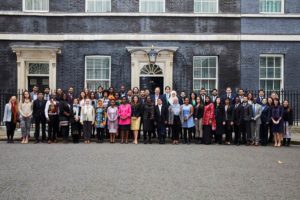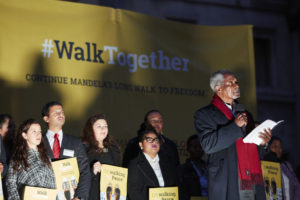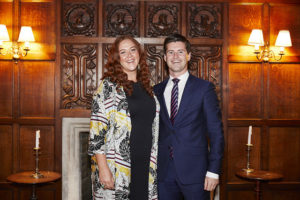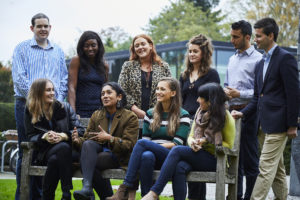The British Council is on the lookout for future leaders aged 18-35 to connect with exceptional individuals from around the globe who have big ideas and want to change the world through policy making. The Future Leaders Connect programme will give 50 people from around the world the opportunity to meet and collaborate, develop policy-making expertise and make valuable connections.
Applications for this year’s programme close on this Sunday, 13 May, at 11.59pm (UK time). Northern Slant spoke to one of last year’s participants, Katherine McCloskey, about her experiences on the programme and the application process. You can find out more about the programme here.
When did you apply to the programme, what attracted you to applying? Describe the application process.
Since leaving university, Katherine has worked in the voluntary sector in various policy related roles in housing, welfare advice and rights, and criminal justice. In 2016, she took up the Public Affairs and Policy Co-ordinator post at NIACRO, combining her academic experience in Law, Politics, and PR and Communications.
“I would be lying if I said I can remember the exact moment I came across Future Leaders Connect,” she told us, but an educated guess would say it was most likely on social media.
“At first, I didn’t think that the programme was for me, I don’t view myself as a global future leader (that’s a big bold title to give oneself) but the programme looked like an incredible opportunity to enhance my skills, meet with other like-minded people, and learn more about the theory and practice of what I do daily.
The application process was straightforward, she continued. “For me the hardest part was choosing my policy change that I would like to see. At NIACRO I had recently developed 6 key Policy Priorities and so choosing one to take forward was difficult. I am also a Board Member of AWARE, a Northern Ireland-based mental health charity, and so it seemed natural to choose addressing mental health in the criminal justice system as my policy of choice. I figured both personally and professionally, it was the area that I could garner the most influence and subsequently make the most impact.”
Following her written application submission, Katherine was called for interview to present her policy vision and to answer questions on relevant experience she had gained. “When I left the interview, I was confident that I had been true to myself and given my best possible interview – something which I believe was helped by my passion for the subject area. I was thrilled to find out that I had been accepted on to the programme soon after.”

Tell us about the programme – the format, location, make-up of participants.
Future Leaders Connect is an inspiring programme where young people from around the world join a long-term network of emerging policy leaders. “Over nine days, the programme gave me the opportunity to develop my policy making expertise; make valuable connections; and gain the skills to have real impact in the area in which I work.
“As a group we took part in an intensive leadership programme in the Møller Centre at Churchill College, Cambridge. We then went to London to discuss major global policy issues in the Houses of Parliament, engaged with inspiring world leaders including the Elders, visited some of the UK’s leading global institutions and collaborated to produce innovative policy recommendations.”
Most participants, Katherine added, were in the early to mid-career stage and had already demonstrated leadership in their specific areas of expertise

Tell us what you learned on the programme. What was your highlight(s)?
Katherine says that the skills, experience and connections she made through Future Leaders Connect have supported her to begin to seize and understand her leadership potential. The programme was packed full of exciting meetings, events and networking opportunities.
“I find it hard to pinpoint one single highlight (there were many) – meeting the Elders was obviously very special and celebrating Nelson Mandela’s long walk to freedom during the procession from Trafalgar Square to the Houses of Parliament was a unique and very inspiring experience.
“As well as this, our conference in Parliament was opened by American journalist, author and three-time Pulitzer Prize winner Thomas Friedman, which was an incredible experience, being a huge fan of his writing.
“One thing that I did learn was the importance of hearing from perspectives different to mine, particularly from my fellow participants in other regions of the world, who have different lived experiences and perspectives.
“I had the opportunity to meet with Matthew Elliott, Chief Executive of the Vote Leave campaign (I’m a firm Remainer, for the record) which reaffirmed the importance of being open to hearing views and perspectives which are not aligned to my own. The calibre of the policy experts, academics and policy makers that we had the opportunity to speak with were second to none.
“Lastly (and most importantly), meeting the other participants and forming lasting bonds and friendships was a memorable experience. It has been a joy to watch their progress and to have a global support network to discuss policy and ideas.
“We continue to communicate via digital means and I have been very lucky to have caught up with some face-to-face. I’m very much looking forward to the reunion when it happens!”

Katherine was joined by another successful applicant from Northern Ireland – now DUP MLA Jonathan Buckley. We ask had they met before? How did you get on?
“I hadn’t met Jonathan until the week before we were due to take part in the programme. I have been a political activist since my teens so working with politicians and political parties is something that I am very comfortable with.
“In terms of our political ideologies, Jonathan and I agree that we are far apart. I think that Future Leaders Connect provided a space for us to have interesting and sometimes difficult conversations particularly in relation to Northern Ireland. We both keep in touch and have met up several times since the programme ended (a luxury afforded to us given how small Northern Ireland is).
“I think it is important for both of us, who have had the privilege to take part in Future Leaders Connect to show that despite the fundamental differences in our ideology and politics, that it is possible to communicate, work together and make change whilst still respecting our different perspectives.”
What have you been up to since completing the programme? What advice would you give to anyone from Northern Ireland considering applying to this year’s programme?
Katherine describes her time taking part in Future Leaders Connect as a watershed moment for her. “I think in Northern Ireland we tend to shy away from our successes and our culture dictates an approach that is much more pragmatic in how we do business. Being on the programme gave me the confidence to offer my opinion; speak up on issues that I feel passionate about; and has boosted my belief that I can create change in my community and further afield.”
Through her connection to Future Leaders Connect, Katherine recently had the opportunity to take part in the British Council ‘Policy Incubator’ in Mexico City in March 2018. The Incubator, organised by the British Council Mexico, was aimed at empowering young people to develop and disseminate counter and alternative narratives as means to participate in the process of influencing public policy in the field of migration.
“This was an incredible opportunity for me to strengthen my policymaking and leadership skills; meet other like-minded young people; and engage with established global leaders. During this process, I met with Juliana Kerr, Director of Global Cities and Immigration at the Chicago Council and together we pitched for seed funding for #MigrantsoftheWorld, a social media-based Social Action Project based on changing the narrative on migration on a global scale. The project is due to launch in May 2018.
“Future Leaders Connect is a must for anyone interested in policy and change on a local, national or global scale. I feel like I have developed my skills both personally and professionally in a way that simply would not have been possible without the help of the Future Leaders Connect, the British Council, and NIACRO for giving me the space and time to immerse myself fully in the programme and all that has developed from it. I now truly feel that I have much more informed insight and potential for my policy vision.
“When I look back on the past year, I could never have imagined the opportunities that would be available to me as a member of the Future Leaders Connect alumni – not only that, but I am proud to say that I have 49 inspiring, thoughtful and courageous friends from all over the world.”
More details on how to apply to the programme can be found here. You can find out more about the Future Leaders Connect 2017 agenda and members here.

Also published on Medium.
